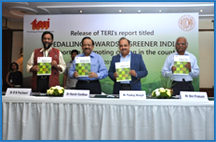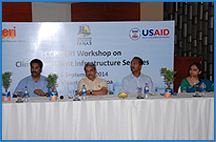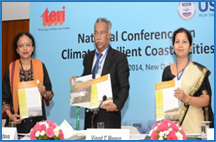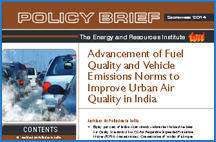|
|
|
| Launch of TERI’s report on promoting cycling in the country |
|
| TERI, in association with the All India Cycle Manufacturers’ Association (AICMA), completed a study on promoting cycling and cycle industry in India. The final report of the study titled ‘Pedalling towards a Greener India: A report on promoting cycling in the country’ makes far reaching recommendations on promoting cycling both in urban and rural India and also making the Indian cycle industry globally competitive. |
 |
The report was released on August 27, 2014 by Dr Harsh Vardhan, Hon’ble Union Minister for Health
and Family Welfare, Government of India. In his inaugural address, Dr Harsh Vardhan highlighted the need to promote bicycling so as to reduce the burden of lifestyle diseases in the country. He also supported TERI’s recommendation to make cycles more affordable in order to increase bicycle penetration in villages, towns and cities of India. The report release was followed by a high-level panel discussion on promoting cycling and cycle industry in India. The event was attended by various stakeholders representing government agencies, cycling industry, sector experts, non-governmental organizations, planners and policy makers. |
|
| Read the full report here |
|
| Join us for a webinar on November 12, 2014 (3:00-4:00pm IST) on promoting cycling and the Indian bicycle industry. Register here |
|
| Read the report release coverage here: |
|
| The Times of India |
|
| Business Line |
|
| Business Standard |
|
| DNA India |
|
|
|
|
|
|
| State level workshop and national conference on ‘Climate Resilient Infrastructure Services’ |
|
| The Energy and Resources Institute (TERI) in association with the Corporation of the City of Panaji (CCP) organized a workshop on ‘Climate Resilient Infrastructure Services’ on September 26, 2014 in Panaji, Goa to disseminate the findings and outcomes of TERI’s year-long study. The study was supported by the US Agency for International Development (USAID) as part of their larger Climate Change Resilient Development (CCRD) program and |
 |
focused on the impact of sea level rise and other climate parameters like rainfall and storms on two coastal cities- Panaji, Goa and Visakhapatnam, Andhra Pradesh.
The workshop was inaugurated by the Honourable Chief Minister of Goa, Shri Manohar Parrikar.
Shri Parrikar in his inaugural address emphasized the need for replicating the initiatives undertaken in Panaji to address the problems related to sea level rise in other coastal areas.
One of the key outcomes of the study is a Data Base Management System (DBMS) for the city authorities to maintain an urban infrastructure inventory. As part of this workshop, a training program on the usage of the DBMS was also conducted for various city officials. The DBMS records locational and coverage details of sectors like: heritage and tourism, water supply, sewerage and drainage, etc. and enables recording, updating and retrieving information for various asset types. The DBMS has been accepted by the CCP and will soon be adopted by the |
| Corporation. After the success of the state level workshop in Panaji, TERI organised a national conference to disseminate the findings for both Panaji and Visakhapatnam. The national conference was held on October 10, 2014 in New Delhi. TERI’s documentary titled: 'Losing Ground: Two Cities and their Tryst with the Future' on the impacts of climate change on infrastructure in coastal cities was also released on the occasion. |
 |
| |
|
| Read more about the conference here |
|
| Access the reports here: |
|
| Case study brief- Panaji |
|
| Case study brief- Visakhapatnam |
|
| Working paper |
|
| Read the coverage here: |
|
| Navhind Times |
|
| The Hindu |
|
| Daily Pioneer |
|
| Business Standard |
|
|
|
| TERI releases policy brief on fuel quality and vehicle emission norms |
|
TERI with the support from the Department for International Development (DfID), UK released a policy brief titled ‘Advancement of Fuel Quality and Vehicle Emissions Norms to Improve Urban Air Quality in India’. The policy brief highlights the issue of deteriorating ambient air quality in Indian cities and suggests policy measures towards improvement of fuel quality and vehicular emissions norms in India. Motor vehicles are
|
 |
| one of the major sources contributing to air pollution at local, regional and global scale. India, which has the largest number of megacities in the world, is facing serious air quality problems in its urban areas. India’s transport sector is the fastest growing consumer of energy. While the developed world has moved to the stricter Euro-V/VI emission norms, the developing countries like China and India have only reached the level of Euro-III equivalent norms across the country. Better fuel quality and improved vehicular emission standards (BS-IV) have been implemented in only a few cities in the country. The policy brief presents the impact of improved vehicular emission and fuel quality standards on air quality and human health. It also presents a cost benefit analysis which shows that the benefits soon outweigh the costs incurred on improvement in fuel quality and vehicular technologies. |
|
| Read the policy brief here |
|
|
|
|
|
| Paper on Smart Solutions for Sustainable Cities |
|
|
